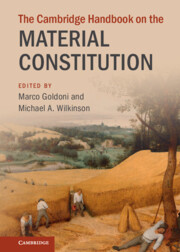Book contents
- The Cambridge Handbook on the Material Constitution
- The Cambridge Handbook on the Material Constitution
- Copyright page
- Contents
- Contributors
- Introduction
- Part I History
- 1 The Tradition of the Material Constitution in Western Marxism
- 2 The Soul of the State
- 3 Laski’s Materialist Analysis of the British Constitution
- 4 Rudolf Smend’s Legacy in German Constitutional Theory
- 5 The Constitution in the Material Sense According to Costantino Mortati
- 6 The Material Constitution of the Dual State
- 7 ‘A Certain Shadowy Totality’
- 8 The Material Constitution in Greek Constitutional Thought
- 9 The Constitution As Social Compromise
- 10 ‘Self-Justifying Law of Constitutional Law’
- Part II Challenges
- Part III Analyses
- Index
2 - The Soul of the State
The Question of Constitutional Identity in Carl Schmitt’s Verfassungslehre
from Part I - History
Published online by Cambridge University Press: 15 January 2023
- The Cambridge Handbook on the Material Constitution
- The Cambridge Handbook on the Material Constitution
- Copyright page
- Contents
- Contributors
- Introduction
- Part I History
- 1 The Tradition of the Material Constitution in Western Marxism
- 2 The Soul of the State
- 3 Laski’s Materialist Analysis of the British Constitution
- 4 Rudolf Smend’s Legacy in German Constitutional Theory
- 5 The Constitution in the Material Sense According to Costantino Mortati
- 6 The Material Constitution of the Dual State
- 7 ‘A Certain Shadowy Totality’
- 8 The Material Constitution in Greek Constitutional Thought
- 9 The Constitution As Social Compromise
- 10 ‘Self-Justifying Law of Constitutional Law’
- Part II Challenges
- Part III Analyses
- Index
Summary
This chapter revisits Carl Schmitt’s argument about constitutional identity. By excavating Schmitt’s material conception of constitutional law, I chart the path of affective constitutionalism in the interwar period of the twentieth century. To facilitate the task of relating mind to matter, I bring to bear insights from Raymond Williams, the literary theorist, and develop an argument about constitutions as ’structures of feeling’. By making this approach to materiality usable for thinking about the affective life of constitutions, I hope to bring phenomenology – the philosophy of experience – to the study of constitutional law.
- Type
- Chapter
- Information
- The Cambridge Handbook on the Material Constitution , pp. 45 - 63Publisher: Cambridge University PressPrint publication year: 2023
- 2
- Cited by

